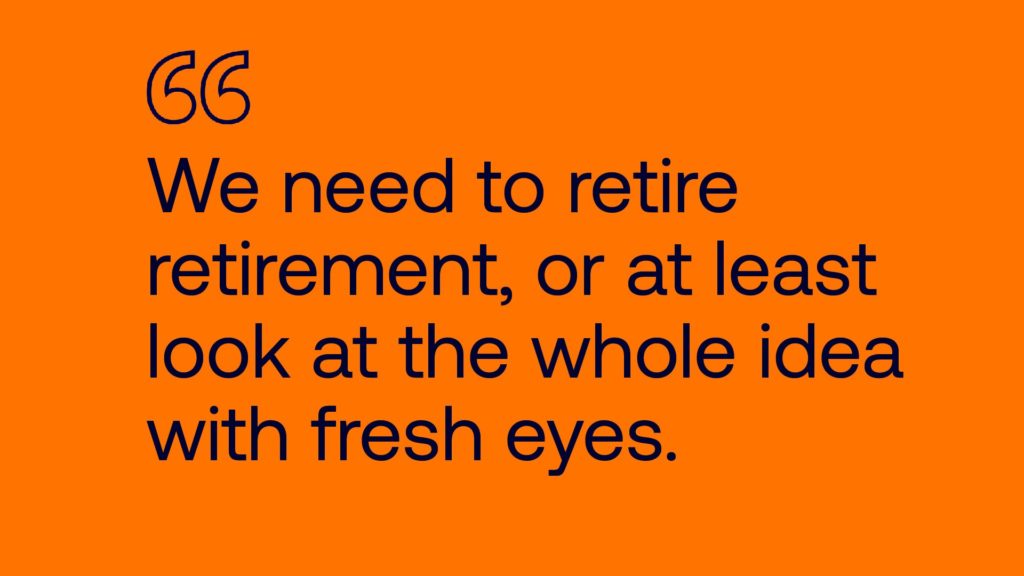Is it time to get future-selfish?
With living to the age of a hundred and beyond becoming a realistic prospect for increasing numbers of people, it’s time to rethink our relationship with our future selves.
The US, UK, France, Korea, Japan and China could all be facing effective bankruptcy because they have not prepared for the ageing of their populations. Long-term demographic trends mean that populations are getting older all around the world. With the younger cohort shrinking there simply aren’t enough working-age people to meet the cost of pensions.
The traditional concept of retirement, predicated on ceasing work at the age of 60 or 65 before living out your days sipping pina coladas on a beach is no longer realistic, warns David C John, Senior Strategic Policy Advisor for the AARP Public Policy Institute. Embarking on retirement when we might still have another 35 or 40 years ahead of us is a recipe for pensioners in poverty and nations on their knees, unable to afford a growing, ageing, economically inactive population.
“This is a true mess. This is one of those cases that every day you delay starting to approach this problem, starting to fix this problem, is only going to make the solution worse and make the outcomes worse,” John says.
But the problem is, most of us are blind to the existence of our future selves.
Wasted on the young?
A series of interviews with young people found that all were blithely looking forward to living well into their 90s and beyond, yet anticipated retiring in their 40s or 50s. The interviewees showed a dawning awareness of what the financial cost of this could be, yet at the same time seemed unconcerned by it.
Proof of the naive optimism of youth? Not really. All of us, says Dan Ariely, Professor of Psychology and Behavioural Economics at Duke University, display a lack of empathy for our future selves. “I’m 51. I think of myself at age 70 and it feels like a different person. I really care about myself tomorrow, but myself at 70-years-old? I just can’t get connected to that person.”
Psychologically, our future, retired selves have as much emotional value to us as a complete stranger. Our brains simply are not wired to anticipate old age. So how can we persuade ourselves to care about this imaginary person?
Meet the future you
Ariely cites research showing that if images of a person’s face are digitally aged, when confronted with the older version of themselves, their decision-making takes their future self into account and choices are made on a longer-term basis. “If you think about it, the decisions we have to make about savings are about giving up something now for that future self. If that future self is a stranger, how much will I give up? If I feel really close to that future self, maybe I’ll give up more,” he says.
Failure to plan for our future lives is a problem for people all over the world. Dr Anthony Yaw Baah, General Secretary of Ghana TUC says: “Living longer is something everybody wants but you don’t want to live for 100 years and half of that you are poor. If you don’t plan now then disaster is waiting in the future.”
One way to sidestep the discipline required to make decisions in the best interest of our future selves is to take advantage of our natural inertia. In the UK, auto-enrolment in workplace pensions – which requires employees to opt out of a pension scheme rather than opting in – has led to huge increases in the number of people paying into pension schemes, says Josephine Cumbo, Pensions Correspondent at the Financial Times. “It’s worked. The number of people saving into pension schemes in the UK has grown.”
“Doing things automatically is a great mechanism to turn our tendency for inaction to work for us rather than against us,” agrees Ariely.

Not just a people problem
But it is not only private individuals who are susceptible to short-termism. All over the world, governments are having to face the challenge of how to provide for their ageing populations.
In Africa, the number of self-employed people creates particular challenges. “Close to 85–90 per cent of our workforce is in the informal sector,” says Samuel Waterberg, former CEO of the Ghana-based People’s Pension Trust. And without employers, there are no workplace pension schemes.
Instead, the Ghanaian government has trialled a system whereby cocoa farmers have a mandatory 5% deducted from their takings and placed in savings. This – and any additional savings contribution the worker is able to make – is matched by the government. It’s an encouraging example of a state adopting the sort of long-term thinking it seeks to encourage in its citizens.
But such forward thinking is unusual at a government level, due in part to the nature of democratic government. “Any politician, from the day that he gets elected, the next thing on his mind is, ‘How am I going to get elected again after four years?’” says Waterberg. “Anything that runs beyond the four or five years – if it’s not popular, they won’t touch it.”
Clearly, if there is a way out of the looming pensions crisis, politicians and governments around the world will need to take a long, hard look at their future selves, too.



